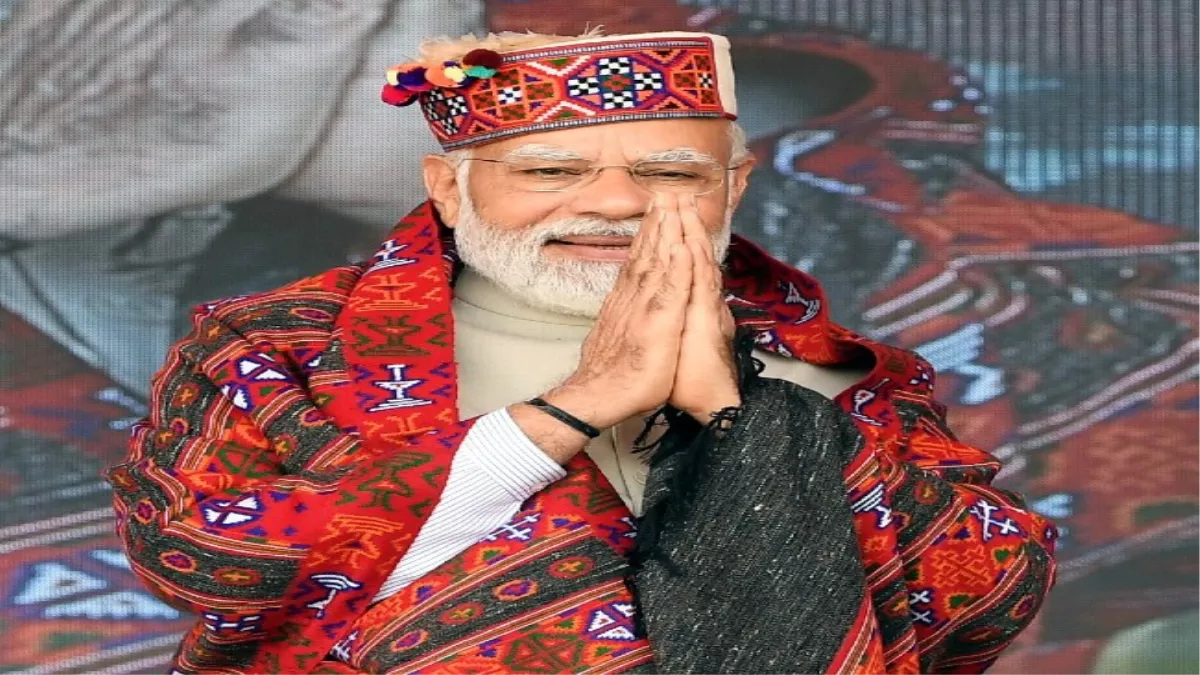

Prime Minister Narendra Modi.
Shimla: The 2.5 lakh Hatti community living in the remote mountain belt of Himachal Pradesh’s Sirmaur district have finally got tribal status which had over the decades remained an empty poll promise.
With President of India Draupadi Murmu granting approval to the bill passed by the Rajya Sabha last week, celebrations have broken out in the 154 panchayats where the Hattis– men and women came-out of their houses to perform their traditional dances and organised community feasts extending gratitude to Prime Minister Narendra Modi and union home minister Amit Shah—who have been instrumental in fulfilling their demand.
The bill to grant tribal status to the Hattis was passed by the Lok Sabha in 2022 in line with a promise made by Amit Shah after being approved by the Union Cabinet.
“For us, it was not an election issue but a matter concerning the lives of a large community living in the far flung and tough mountain belts of Sirmaur, bordering Uttarakhand. It was a paradoxical situation that their counterparts in Jaunsar Bawar area of Uttarakhand were already enjoying the benefits extended to tribal communities. Thus, it was a very strong case that our government at the centre considered the issue sympathetically, says former Chief Minister Jai Ram Thakur.
The Hattis occupy a region between two waterways called ‘Giri’ and ‘Tons’. Tons isolates it from the Jaunsar Bawar area of Uttrakhand. The Hattis once formed a major part of the royal estate of Sirmaur until Jaunsar Bawar’s partition in 1815.
The number of Hatti tribes in the Giripar area is around 62 percent. Now, the funds under the tribal sub-scheme from the state budget and central funding will be available for their development and welfare.
President of the Central Hatti Committee Dr. Amichand Kamal and general secretary Kundan Shastri on Sunday thanked President Draupadi Murmu for the quick approval.
“For this, he also thanked Prime Minister Narendra Modi, Home Minister Amit Shah and BJP President J P Nadda,” they said.
The Hattis will be eligible for reserved seats in the tribal category in educational institutions and government jobs. Along with financial assistance grants, additional funds will also be available for development schemes. Students will get scholarships from school to higher education. Loans at low interest rates and subsidy will be available in agriculture and horticulture. The vanishing Hatti folk culture will now be protected and promoted, says Suresh Kashyap, BJP’s Lok Sabha member from Shimla.
The demand of the community has allegedly been hanging fire since 1967. However, after the strong protests across the region, residents of district Sirmaur of Himachal Pradesh managed to spread their voice outside the state as it finally reached New Delhi.
In 2019, the Hattis had threatened to boycott the polls but later got assurance from union home minister Amit Shah who gave a greater push to the issue.
Hattis name is drawn from their custom of selling local vegetables, crops, meat and fleece at tiny markets called ‘Hatts’ in towns. There is a rigid caste system among the Hattis. The ‘Bhat’ and ‘Khash’ are the upper caste people while the ‘Badhois’ are underneath them. Generally, inter-caste marriages and relationships are not acceptable.
This tribal status brings worry to lower caste people as they fear after the implementation of this status, they will lose the constitutional reservations which help them to secure government jobs. But the state government has assured that benefits available to Dalits will continue.
For a long time, the Hatti region had been a Congress stronghold. But in recent years, the BJP improved its presence in the area by getting the backing of the Hatti community in the Parliamentary elections.
The BJP, its manifesto had promised to give ST status to the Hattis. Not lagging behind, in 2016, the then Congress Chief Minister Virbhadra Singh raised the issue with the central government and pushed for tribal status to the Trans-Giri region and DodraKwar in Rohru. Nonetheless, the proposition was turned down that the Ethnography Report was deficient and requested a complete Ethnographic review.
Also, a fresh study was conducted by Himachal Pradesh University and a new report was submitted in March by the BJP government.
Union Minister of Ports, Shipping and Waterways, Sarbananda Sonowal, said on Monday that the number…
The inhabitants of Pakistan-occupied Jammu and Kashmir (PoJK) have been enduring years of neglect as…
The Defence Research and Development Organisation (DRDO) is set to make a significant impact at…
Cyprus President Nikos Christodoulides and Prime Minister Narendra Modi on Monday viewed the mountains near…
Cyprus President Nikos Christodoulides said he and Prime Minister Narendra Modi discussed expanding bilateral ties…
Prime Minister Narendra Modi said on Monday that India and Cyprus will develop a strong…